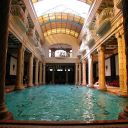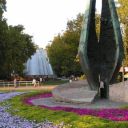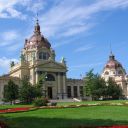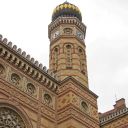
Sights & culture in Budapest
We have 8 entries so far.
Géllert Bath & Spa
Kelenhegyi út 4, Budapest, Hungary
![]() gellertbath.hu
gellertbath.hu ![]() + 36 1 466 6166
+ 36 1 466 6166
Situated in the hotel Gellért in Buda, along the Danube river, the traditional Hungarian Gellért Baths complex was built 1912-1918 in Art-Nouveau style and the main hall boasts by a glass roof. The Bath includes thermal baths (small pools containing water from Gellért hill's mineral hot springs) beautifully decorated by mosaic tiles, saunas with plunge pools, an open-air swimming pool (artificial waves every 30 min.) and sparkling indoor swimming pool. As well Finnish sauna with cold pool, children's pool and massage services are available. It is open to the public, but hotel guests enjoy a free admission.
Write a review
Hungarian Puszta ranch - a horse show
Kalocsa, Hungary
![]() tripsavvy.com
tripsavvy.com
If you have one day free during your stay in Budapest don´t miss the opportunity to go out of city to the Puszta (Hungarian steppe) and see the Horse Show of Hungarian cowboys. It is a fascinating experience! There are many agencies organizing trips to Puszta in Hungary, you can try e.g. the agency 'Lovely Budapest'.
Write a reviewBuda Castle
Szent György tér 2, Budapest, Hungary
![]() budacastlebudapest.com
budacastlebudapest.com ![]() +36 1 458 3000
+36 1 458 3000
Buda Castle, the fortress and palace complex of Hungarian kings, completed in 1265 following the Mongol invasion, was destroyed and rebuilt many times. Built on medieval foundations, the Renaissance structures were destroyed by the Turks. Later, the Baroque Palace burned down, then its reconstructed buildings were damaged during the War of Independence (1848). In the late 19th century Miklós Ybl oversaw the reconstruction and enlargement of the Palace, which was completed in the neo-Baroque style by Alajos Hauszmann.
Write a reviewMatthias church (The church of our Lady)
Szentháromság tér 2, Budapest
![]() matyas-templom.hu
matyas-templom.hu
This famous landmark, located in Castle District, is known as Matthias Church after the much-loved 15th-century Renaissance king who contributed the towers and was married here. Most of the exterior was added around 1896 in a Gothic style. The interior is decorated with works by two outstanding 19th-century Hungarian painters, Károly Lotz and Bertalan Székely. The wall left of the entrance represents the Renaissance, while the wall across from the entrance has Eastern motifs to represent Ottoman rule. On the left side of the church is the tomb of St. Imre, son of King St. Istvan and heir to the throne.
Write a reviewMargaret Island (Margitsziget)
Margitsziget, Budapest
![]() youtube.com
youtube.com
Margaret island (originally known as Rabbits Island) is a popular recreational, green oasis in the middle of the Danube in central Budapest, long 2,5 km and 500 metres wide. Rent a bicycle, jog, swim in one of 11 pools, throw a Frisbee, tour 12th century ruins, or just stroll around. This was originally a religious centre. The ruins of St Margaret's Dominican nunnery are on the east side near the ruins of a Franciscan church. The water tower, built in Art Nouveau style, is over 100 years old. A very fine lunch can be had in the Ramada Grand Hotel at the north-east end of the island.
Write a reviewSzéchenyi Gyógyfürdő Thermal Spa
Állatkerti krt. 9-11, Budapest
![]() szechenyibath.hu
szechenyibath.hu ![]() +36 1 363 3210
+36 1 363 3210
Located in Pest, it is one of the largest bathing, medicinal complexes in Europe. Its thermal springs were discovered in 1879; they are the deepest and hottest (74 - 75°C) thermal wells in Budapest. The neo - Baroque baths were built in1913, the swimming pool in 1927. The open - air sections with their pleasantly warm waters are equally popular in winter. Components of the thermal water include sulphate, calcium, magnesium, bicarbonate and a significant amount of fluoride acid and metaboric acid.
Write a reviewDohány Street Synagogue (Dohány utcai Zsinagóga)
Dohány u. 2, Budapest
![]() greatsynagogue.hu
greatsynagogue.hu ![]() avivtravel@gmail.com
avivtravel@gmail.com ![]() +36 (1) 343 0420
+36 (1) 343 0420
Built in 1859, the Dohány Street Synagogue (also known as the Great Synagogue) is the largest synagogue in Europe and the second largest in the world. The Synagogue is designed like a basilica and includes some striking Byzantine and Moorish elements. The interior is vast and ornate, with two balconies and, unusually, an organ. Its ark contains 25 torah scrolls taken from other synagogues destroyed during the Holocaust. You can take one of the three Jewish Heritage tours to visit the synagogue and related sights.
Write a reviewGellért Hill & the Citadel
Buda, District 1, Budapest, Hungary
![]() budapestinfo.hu
budapestinfo.hu
The hill got its name after St. Gellért - a missionary bishop who came to Hungary around 1000 AD in order to convert the Hungarians to Christianity. But pagan leaders captured him and rolled him down from the hill in a barrel. The St. Gellért monument and its fountain representing his martyrdom can be found on the Northeastern slope of the hill facing the Elisabeth bridge. The fortress of the Citadel was built by the Habsburgs in 1851 to demonstrate their control over the Hungarians. From the panorama terraces one can have a stunning view of the city. By a short walk one can reach the Liberation Monument.
Write a review-
ATB Airport Transfer Budapest
Transfer services -
VIP Escorts
VIP companions -
Budapest Student Escort
VIP companions -
Budapest Jazz Club
Nightlife -
Peaches and Cream - R'n'B night club
Nightlife -
Budtransfer
Transfer services -
Budapest 4 Escort
VIP companions -
Budapest Babes
VIP companions -
Budapest Escorts Girls
VIP companions -
Pierrot restaurant
Restaurants















